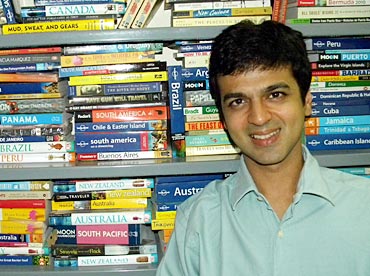Prasanna D Zore
It was not that Aashish Gupta didn't enjoy working as a software engineer for multinational giants like Microsoft and Amazon. But he was not meant to be left facing a dull, drab computer monitor all his life. Although his career was exciting as an engineer doing "cutting-edge work", he hated being "lost in the crowd".
After mulling over his options during his days at MS and Amazon, he chose to strike out on his own as an entrepreneur. Coming from a Marwari family, setting up his own business may well have been a natural progression.
"I wanted to do something without my father's support," says Aashish, who was born in Goa but moved to Mumbai to study computer science at Thadomal Shahani.
It is this independent streak that helped Aashish cope when he went to New York to do his masters in computer science from Stony Brook University. Later, after working for almost seven years -- three years with Microsoft in Seattle, another year with Amazon.com in the same city, and later in Hyderabad for three years -- Aashish decided to hang up his boots and enter the world of start-ups.
Today, it has been only about eight months and Aashish's YellowLeg.com that sells books to "discerning travellers" has notched up revenues of Rs 8.5 lakh (Rs 8,50,0000).
In an interview with Prasanna D Zore, Aashish discusses the challenges start-ups face and mistakes they should avoid.
You said you loved your jobs at Microsoft and Amazon. Then why did you quit to start on your own?
I didn't particularly like being part of very big companies where you become anonymous and can't contribute towards where the company will head. It is like being just one employee amongst thousands of them.
What was your 'it' moment when you decided you wanted to quit the software industry and strike it out on your own?
It wasn't like I didn't like the stuff I did. But I had in my mind from the very beginning that I wanted to be an entrepreneur one day. So to quit the industry was not a sudden decision.
How difficult was the transition: from taking orders to being on one's own self?
It was actually reverse for me. I was an independent person and being a Marwari I grew up in a business family. I was probably the first person in a few generations who worked for somebody else and reported to a higher up.
So starting to work for somebody coming from a business family was a difficult transition for me than leaving a company to start on my own.
What kind of money did you invest in your venture?
I started with investing about Rs 5 (Rs 500,000) to 6 lakh (600,000) and put in more as I went along. It's only been about 14 months now and we have revenues of about Rs 8.5 lakh (Rs 8,50,0000).
What's your business model and how do you make revenues?
One is of course selling of books online that's the biggest revenue stream that we have right now and then we offer personalised travel consultancy and ad revenues from our web site.
What was your parents' reaction when you first told them that you wanted to work in a company and then later when you told them that you were quitting your job?
My parents discouraged me from working in a company because they came up the hard way in their lives and wouldn't want me to go through the same path. So, initially they discouraged me and tried to change my mind.
But for me I wanted to see the outside world, gather as much experience as I could by working independently. Later they accepted my decision when they saw my passion and energy to strike it out on my own. They respected my decision finally.
Challenges that you faced as a start-up...
The biggest challenge that I faced, like most other entrepreneurs, was putting something together from scratch. It was very different from working for a company that has ready-made resources in terms of people and cash.
The other challenge was to build a payment gateway for making online payments over the Internet. The most interesting hurdle was providing a landline number of my office for setting up this gateway and I didn't have a landline number in the name of my company, YellowLeg.
So, I had to get my home landline number, which was registered in my wife's name, registered in my name after getting a no-objection certificate from my wife. Also, I needed a bank account to start the business and getting a bank account needed to have a business address which didn't even exist then.
Mistakes start-ups should avoid...
I think start-ups shouldn't take risks that are too big for their survival
Take baby-steps to check what works and what doesn't for your start-up
Three must-read travel books
- Into the Wild by Jon Krakauer
- The Way of the World by Nicolas Bouvier
- Himalaya by Michael Palin


Comment
article